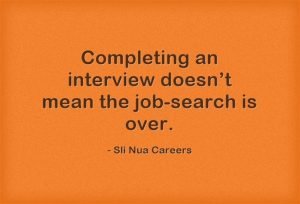By Sabina Trench, Career Coach, Sli Nua Careers

Central to ensuring that career gaps are as brief as possible is each individual’s approach to their specific set of circumstances. It’s undeniable that unemployment can test the most resilient of us, with spare time and heightened uncertainty leaving the mind susceptible to periods of desperation. Formulating a strategy and action plan will help in mitigating these doubts, while giving you a sense that your job is ‘getting a job’, writes SABINA TRENCH, CAREER COACH, SLI NUA CAREERS.
 The natural reaction during unemployment is to apply for every vacant situation you see. While you may get an initial sense that you are being productive, thelikelihood is the vast majority of these efforts will be in vain. A more efficient approach would be to analyse the job specifications and identify how your skills match the role. It’s important to consider your development within the role – taking a job for the sake of it may be the first step on a road that leaves your back at square one. Contemplate the skills you need to develop to be successful in actually doing the job, as opposed to getting the job. Interview stage is all about preparation and performance. Employers won’t go out of their way to give you a job just because you need it, so there’s no scope for winging it.
The natural reaction during unemployment is to apply for every vacant situation you see. While you may get an initial sense that you are being productive, thelikelihood is the vast majority of these efforts will be in vain. A more efficient approach would be to analyse the job specifications and identify how your skills match the role. It’s important to consider your development within the role – taking a job for the sake of it may be the first step on a road that leaves your back at square one. Contemplate the skills you need to develop to be successful in actually doing the job, as opposed to getting the job. Interview stage is all about preparation and performance. Employers won’t go out of their way to give you a job just because you need it, so there’s no scope for winging it.
A review of the company’s website will reveal a great deal about the companies values and its culture. Additionally, organise appropriate responses to the generic questions that you can anticipate, as well as concrete examples that illustrate your competence when faced with particular situations. A critical mistake to make is displaying that you value your own needs over that of the company’s. This includes enquiries made about salary, holidays or various benefits too far in advance of a job offer.
Over-estimating your estimation of how the interview went will time and time again hamper a job-search. It’s common that those who felt the interview ran smoothly failed to receive what they deemed to be an imminent job-offer, while those who felt they didn’t perform in a tough interview impressed the panel regardless. The danger with the former is that as you expect the offer to come, you close yourself off to other and potentially more suitable opportunities. Completing an interview doesn’t mean the job-search is over. It’s prudent to re-direct your focus back onto the job market until you receive the offer.
Another important, often-neglected nuance in the jobs market is the thank you email. Its power can be underestimated. For example, it can act as a gentle reminder to a panel after interviewing numerous candidates that you’re keen on the role and refresh their memory of your strengths. Should the job offer not come in the subsequent fortnight, a subtle email enquiring if they had come to a decision on the position on the role is acceptable. Companies often take time with decisions and annual leave and key projects can often delay the process. However, should this effort not reap the rewards, it’s best to focus your attention on other roles.
You can read more blogs from Sabina HERE
Sabina Trench is a Career Coach with Sli Nua Careers, who have offices in Galway, Limerick, Athlone, Sligo and Mayo, plus a full online service. Their services include CV preparation, interview training, personal statements and application forms.